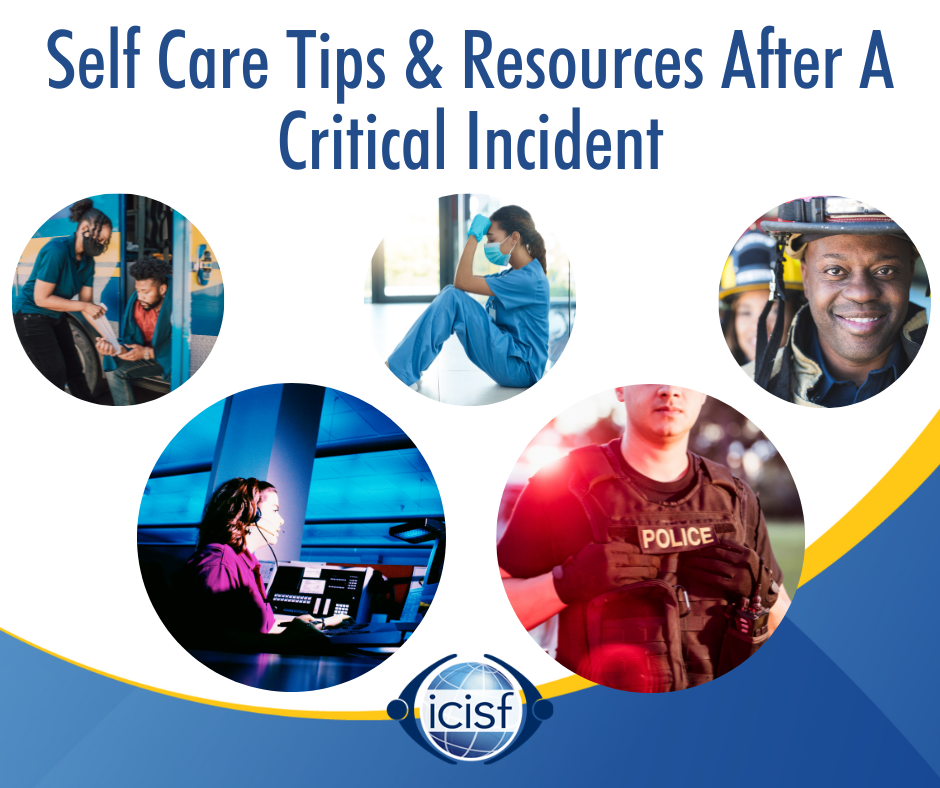Self Care Tips and Resources After A Critical Incident, from ICISF
Date:Monday June 19, 2023

Have you ever experienced a traumatic event or a critical incident (any event that causes unusually strong emotional reactions that have the potential to interfere with the ability to function normally)?
From the very beginning, Critical Incident Stress Management (CISM) was, and continues to be, a crisis system based on a resiliency model. It aims at building resistance before, during and after exposure to traumatic events. It focuses on rebounding from stress. Below are some self-care tips for individuals and for family members and friends that are helping individuals after critical incident occurs.
Self-Care Tips
- Within the first 24 – 48 hours of a critical incident: periods of appropriate physical exercise, alternated with relaxation will alleviate some of the physical reactions.
- Structure your time; keep busy.
- Talk to people; talk is the most healing medicine.
- Reach out to someone else; people do care.
- Spend time with family, friends or loved ones.
- Help your co-workers as much as possible by sharing feelings and checking out how they are doing.
- Keep a journal; write your way through those sleepless hours.
- Do activities that feel good to you.
- Do make as many daily decisions as possible that will give you a feeling of control over your life; i.e., if someone asks you what you want to eat, answer them even if you’re not sure.
- Get plenty of rest or restorative sleep.
- Eat well-balanced and regular meals.
For Family Members and Friends
- Listen carefully.
- Offer your assistance and a listening ear if they have not asked for help.
- Reassure them that they are safe.
- Help them with everyday tasks like cleaning, cooking, caring for the family, and minding children.
- Give them some private time.
- Don’t take their anger or other feelings personally.
- Don’t tell them that they are ‘lucky it wasn’t worse;’ a traumatized person is not consoled by such statements. Instead, tell them that you are sorry such an event has occurred, and you want to understand and assist them.
ICISF, Inc. offers a variety of crisis intervention core courses, such as our Assisting Individuals in Crisis and Group Crisis Intervention courses, which walk you through various critical incident stress management (CISM) techniques, when and how to use each one, and include group exercises to practice the skills you’ll need.
If you’re interested in learning how to better manage stress in your life in order to increase your potential for happiness and success, you can take The Secrets of Psychological Body Armor ™ – Holistic Wellness for Emergency Services and Healthcare Professions course. If you’re looking to cope with strains from everyday stressors to trauma, you can take our Resilience Training: Psychological Survival Skills for Before, During & After Crises specialty course. To view upcoming course dates and details, visit our Virtual Training and Asynchronous Online Course pages.
Looking for additional resources? You can watch our CISM Live Series as we speak with Dr. Stephanie Conn about “First Responders: Resilient Minds for Chaotic Times”. You can also download PDF’s within our Crisis Resource Library such as Stress Management Principles After A Critical Incident, Methods To Maintain and Enhance Resilience and the Critical Incident Stress (CIS) Information Sheet. You can view/download more PDF’s, view videos, purchase books and more on the ICISF Resource page.
CISMbooks Newest Book Release!

Duty, Honor, Hope Strategies for Understanding & Unpacking First Responder Grief
By: Beth L. Hewett, PhD, CT, CCISM, CEOLS
Many first responders experience traumas from critical incidents, which often are assisted by Critical Incident Stress Management (CISM) interventions. Yet one of the most lasting effects of critical incidents may be the grief first responders feel from witnessing victims’, coworkers’, and family members’ deaths, as well as the multiple losses anyone might experience: career changes, life transitions, long-term illnesses, and more. Because first responders must return to their work, often immediately after a critical incident, many of these griefs go unmourned, placed into containers in which they accumulate and stack up. Over time, these containers fill up and over flow. Dr. Hewett teaches a first response action approach to addressing stacked up griefs and preventing them from reaccumulating and negatively affecting work and home life. Learn More
